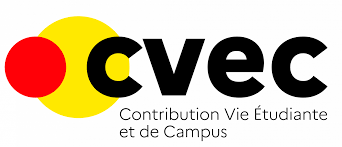Understanding the Contribution to Student and Campus Life (CVEC)
If you’re an international student in France, you’ve likely heard about the CVEC, but you might be wondering: what is the CVEC, and why do you need to pay it? Don’t worry, we’ve got all the details to help you understand what the CVEC is and why it’s important! 🏫
What is the CVEC? 🤔

The CVEC stands for “Contribution to Student and Campus Life” (Contribution Vie Étudiante et de Campus). It’s a mandatory fee for students enrolled in a French university. This fee helps fund services that enhance student life, including:
- Campus health services 🏥
- Sports activities 🏀
- Cultural and social events 🎭
- Support for student initiatives 📚
So, when you pay the CVEC, you’re actually contributing to services that aim to improve your experience as a student in France. It’s all about enhancing your life on campus! 🧑🏻🎓
Who needs to pay the CVEC? 💸
All students in higher education institutions in France are required to pay the CVEC, including international students. However, there are a few exceptions:
- Exchange students (Erasmus): You’re not required to pay the CVEC.
- Scholarship holders: If you’re receiving a government scholarship, you are exempt from paying the fee.
Important: Even if you’re exempt, you still need to register for the CVEC and indicate your exempt status.
How much is the CVEC?
The CVEC costs around 100 euros per academic year. It’s a one-time payment, so you only need to pay it once at the beginning of the academic year, even if you attend multiple institutions.
How to pay the CVEC?
The process to pay the CVEC is simple and straightforward. Here’s how to do it:
- Go to the official CVEC website: https://cvec.etudiant.gouv.fr 🖥️
- Create an account and log in.
- Pay online using a credit card or other approved methods. You’ll immediately receive a certificate of payment, which you’ll need for university registration. 📑
If you’re exempt, you can still go through the steps to receive a certificate of exemption.
Why is the CVEC important?
You need the CVEC certificate to complete your university enrollment. Without it, you won’t be able to officially register. So, make sure you have either the CVEC payment certificate or the exemption certificate before starting the enrollment process. ✅
Key points to remember 🏆
The CVEC is a mandatory fee for most students in France.
- It costs 95 euros per year.
- You need to pay the CVEC before completing your university registration.
- Some students are exempt from the payment but must still register to receive the exemption certificate.
By understanding and paying the CVEC, you contribute to a better student experience on campus, and it’s an important step in your student journey in France. Now that you know what the CVEC is, make sure you’re ready to complete your registration process!
FAQ❓
Most students enrolled in French higher education institutions must pay the CVEC, including international students. However, exchange students (such as Erasmus) and scholarship holders may be exempt.
Yes, if you are awarded a scholarship after paying the CVEC, you may be eligible for a refund. You will need to submit proof of your scholarship status to request reimbursement.
If you are a scholarship holder or an Erasmus exchange student, you are exempt. However, you must still register on the CVEC website to receive a certificate of exemption.
While it’s not mandatory for all legal documents, it is highly recommended for any communication where you need proof of delivery, such as contract terminations, official notices, or disputes.
Similar Posts
What is Campus France? 🌍
ByMargauxWhat is Campus France? 🌍 If you’re an international student considering studying in France, you may have come across the term Campus France. But exactly what is Campus France? Campus France is the national agency responsible for promoting French higher education abroad and assisting international students and researchers in their plans to study in France….
How to Follow the APL Request: A Complete Guide for International Students in France 📲
ByMargauxIf you’re an international student in France, receiving APL (Personalized Housing Assistance) can be a huge financial relief. But after submitting your application, knowing how to follow the APL request status is crucial to stay updated on its progress and anticipated payment dates. Here’s everything you need to know to follow your request and understand…
How to open a French Bank Account ? 🏦
ByMargauxOpen a french bank account easily with us ! Opening a French bank account is an essential step for anyone moving to France, whether you’re a student, an expatriate worker, or a new resident. Here’s a comprehensive guide for you to open a French bank Account easily ! You don’t know if you need a…
What is a Récépissé de Titre de Séjour? 🤔
ByMargauxGUIDE – The récépissé de titre de séjour What is a Récépissé de Titre de Séjour? 🤔 If you’re living in France as an international student or resident, you’ve probably heard about the importance of having a titre de séjour (residence permit). But what happens if your titre de séjour expires or you are waiting…
Prepare your suitcase according to the French weather !
INTRODUCTION TO the french weather Prepare your suitcase with dare&go ! 🌟 Are you ready to prepare your suitcase and embark on the French adventure? Well, get ready to travel through the European seasons. But before that, let us guide you through the mysterious world of french weather so that you can pack your suitcase…
5 reasons to have a French bank account as a student in France ! 💳
ByMargauxIf you have just arrived in France or are planning to move there, opening a French bank account is a crucial step. Here are 5 reasons why you absolutely need a bank account in France. Layz to read ? Check out our Youtube video to know all about French bank account !🔥 1. EASE YOUR…

